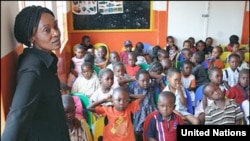On June 20, the international community marked World Refugee Day. The UN High Commissioner for Refugees, or UNHCR, reports there are over 60 million displaced people worldwide – 20 million refugees and 40 million internally displaced, the largest number since World War II.
“Humanitarian crises around the world make painfully clear that despite our best efforts, all nations must do more,” said United States Ambassador to Botswana Earl Miller. In an editorial marking World Refugee Day, Ambassador Miller noted that, “too often refugees and asylum seekers are turned away, denied a safe haven, and refouled, or expelled.
The United States is seeking commitments to expand the humanitarian safety net and create more long-term opportunities for refugees and displaced people worldwide. We call on our friends and partners to rise to the challenge and honor their commitment on protecting refugees’ right to life.”
One of those friends is Botswana. “Botswana currently hosts roughly 3,000 refugees at Dukwi Camp who have fled a wide array of conflicts and violence from as far away as Somalia to as close as neighboring Zimbabwe,” Ambassador Miller noted.
“The Government of Botswana, in conjunction with UNHCR, provides them with schooling, housing, and medical treatment. The U.S. Government is working to assist where we can; we help fund the camp’s healthcare system in addition to providing small grants to organizations that offer skills training and safe spaces for the camp’s youth. We are working with the Government of Botswana and UNHCR to find durable solutions for these refugees.”
Since 1975, the United States Refugee Admissions Program welcomed over 3.2 million resettled refugees from around the world. In each of the last three years, the United States has resettled nearly 70,000 refugees and this year we aim to resettle up to 85,000.
In addition, President Barack Obama announced the United States will admit 100,000 in 2017. The Refugee Admissions Program offers the world’s most vulnerable refugees the opportunity to find safety and start over in communities across the United States.
“While the scope of the global refugee and displaced persons crisis is massive, our humanitarian response can be as well,” Ambassador Miller concluded. “By welcoming refugees, we reaffirm our common humanity and our commitment to building a common peace.”






